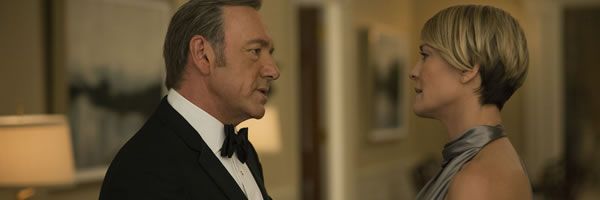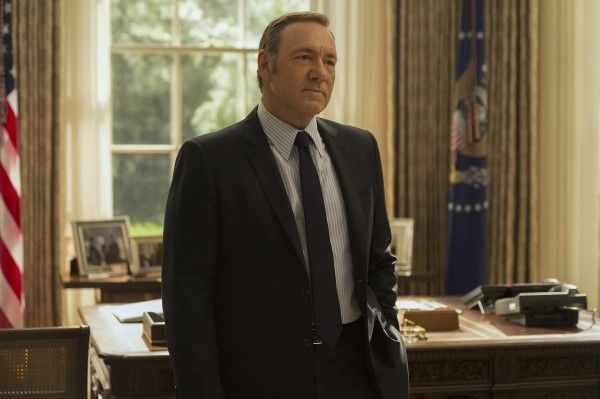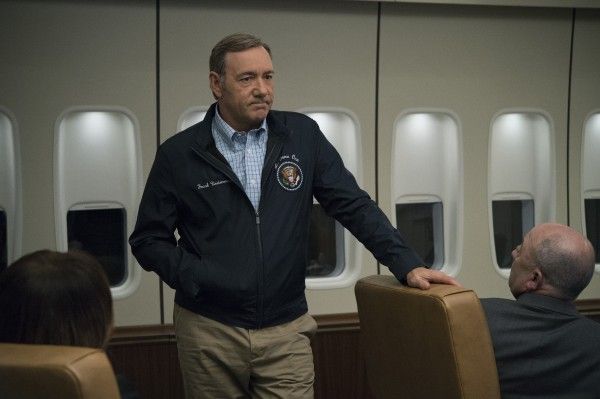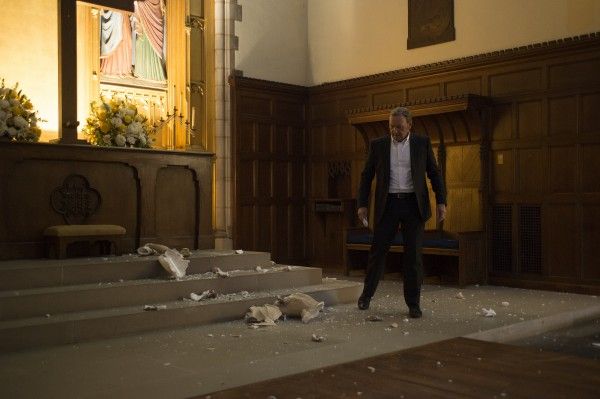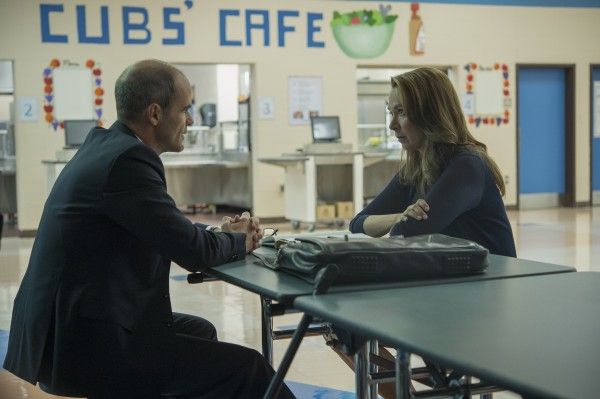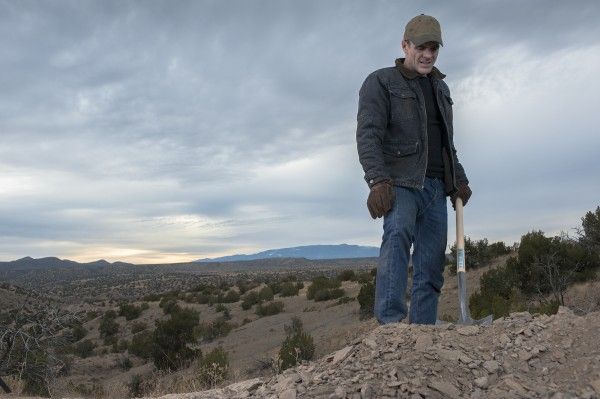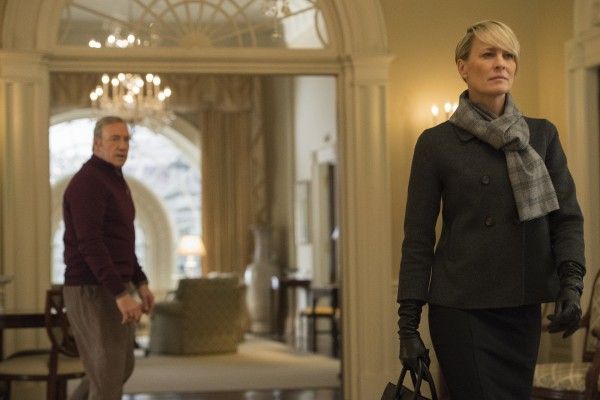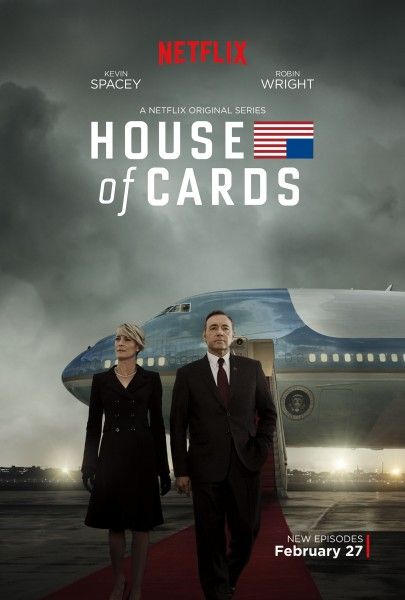Despite all the lunacy it took to get there, House of Cards: Season 2 had an outstanding finish. The backstabbing, honeyed words, and massive gambles paid off, and the final image was a victorious Frank Underwood (Kevin Spacey) in the Oval Office, double-tapping his fist on the Resolute desk. If this is where House of Cards had ended, it would be a strong conclusion, and the show would have gone out on top.
When it was announced that House of Cards would be coming back for a third season, I assumed it would be “The Fall of Frank Underwood”. There was nowhere for him to go but down. However, House of Cards: Season 3 doesn’t really know where to take Frank, so it bounces him all around but without a real goal in sight. This leads to a wildly uneven season where the show manages to deliver repulsive actions and eviscerating dialogue, but without the calculation of the first two seasons. We’re dropped into the new story far too late, and then the show stalls for time as plotlines are needlessly stretched out and new supporting characters fail to garner our interest.
Although the first scene of Season 3—Frank pissing on his father’s grave—hints that we’ll be getting the craziest season yet—the story really begins with exposition intertwined with a reintroduction as we discover that Doug Stamper (Michael Kelly) survived getting his head bashed in by Rachel (Rachel Brosnahan), but has had to endure a long, and difficult recovery. During his recovery, Doug (and the audience) learns we’re already six months into the Underwood presidency and it’s been a series of failures.
We’re not treated to seeing those failures. The writers apparently reasoned that Frank and Claire (Robin Wright) work best when they’re at the bottom and backed into a corner. And that’s fine, except we’re only told how they fell, and watching them try to claw their way back out now comes off as incompetence. Frank and Claire committed a massive, bloodless coup (if you ignore Peter Russo and Zoe Barnes), and Season 3 has them floundering from their own rookie mistakes. If there had been some gradual deterioration where we saw how they were overwhelmed by the Presidency, it would be easier to swallow that Frank and Claire are being constantly outmaneuvered. Would Claire—someone who was collected enough to betray a rape survivor—really get flustered by a Senate hearing committee? Would Frank—who sees his job stolen away from him in the very first episode—really be surprised that the Democratic leadership doesn’t want him to run for another term? The Underwoods should know better, and in Season 3, they know surprisingly little.
Instead, Frank is a President who struggles with two (and apparently only) issues during his time in office: First, he has to get his “America Works” program off the ground, which seeks to end all entitlements and use the money to fund a $500 billion program that would create 10 million jobs. Second, he wants to create peace in the Jordan Valley between Israel and Palestine, but to do so he has to partner with the abhorrent Russian President Vladamir Putin Viktor Petrov (Lars Mikkelsen). The latter goal is further complicated by Claire’s request that she become the U.S. Ambassador to the United Nations even though she’s unqualified for the position and her appointment would reek of nepotism.
The third season of House of Cards treats us to a new side of Frank Underwood, but a less interesting one. The season starts with plenty of potential by seeing how Frank will act now that he’s achieved his highest goal, which is ultimate power. The first two seasons let us know that Frank is amoral and craves power as an idea, but he never had any ambition on altruistic goals. Frank doesn’t care if he makes the world “a better place.” Power is the end goal to Frank, and now that he has it, he has no idea how to wield it. In theory, that’s a fascinating and natural turn for the character, but in practice, it looks like Frank lost all of his game.
He relies heavily on sweet talk, has no idea how to maneuver, and is constantly being outflanked by mere mortals. We’re lead to believe that someone as intelligent as Frank would have no idea how to hold on to power, and perhaps we could believe it if we had seen those lost six months in between when last season ended and this season begins. I want to see how Frank Underwood is a man reduced to crying in the fetal position because no one will give him money to run for a Presidential election. Instead, the best we get is seeing how Frank has become completely neutered and dropped his scalpel for a sledgehammer.
While I wish I could applaud the show for providing its protagonist a unique “fall”, we never saw the descent, and this floundering Frank Underwood is overshadowed by everything. The story structure undercuts him at the outset, he’s not as savvy as he once was, and he now appears to be part of an ensemble rather than the puppet master. There is a nice irony in that the Presidency has finally made Frank “human” (or some facsimile thereof), but this novelty eventually becomes wearisome as the story refuses to drive Frank further.
Season 3 spends a large amount of time rearranging furniture as every bold action is almost always followed by listlessness or retreat. Frank spitting on the face of a Jesus statue in the middle of a cathedral is shocking, but it doesn’t have any lasting impact in terms of the character’s bravado, and it certainly doesn’t introduce an element of religion. It’s a “holy shit” moment (no pun intended) but without further investment thematically or in terms of the character’s personality. We know that Frank sees himself as above God, but it doesn’t lead to a newfound confidence or resolution.
This forward-retreat dynamic repeats most often in the relationship between Frank and Claire, but without much dramatic tension. They’ve become ordinary and in a season that’s so crowded with unnecessary or half-hearted plotlines, the Underwoods are just another couple. They’re depowered, and while they may be the most interesting two characters, that’s only because almost everyone else pales by comparison.
The best returning character outside of the Underwoods continues to be Doug, and yet his presence is emblematic of the season’s awful pacing. He’s introduced as a way to catch us up on what the Underwoods have been doing, but he’s sitting frustrated on the sidelines. Most of the season is watching Doug wrestle with depression and attempting to find a purpose, and without Kelly’s outstanding performance, these scenes would likely be interminable because it’s mostly stalling. We’ll get a highlight like Doug in prime cloak-and-dagger mode as he talks to Presidential candidate Heather Dunbar (Elizabeth Marvel) over the phone in a darkened hallway, but then he’ll be back to sulking in his apartment.
This poorly drawn character arc ultimately leads to the underwhelming climax of Doug finally tracking down Rachel and wrestling with himself over whether or not he should kill her. For all the time spent on other characters, we barely spend any with Rachel this season, and so she’s just an object in Doug’s choice rather than a person. We’ve lost the residual feelings we had for her in previous seasons, and Doug’s life will likely be the same whether he kills her or not. When we cut to Doug burying her body, it lacks any emotional impact. We don’t mourn her loss and we don’t bear any enmity towards Doug.
Rather than spend time with Rachel and invest in a plotline that will come together with life-and-death stakes, House of Cards putters around with supporting characters who add little to the overall story. Bringing in novelist Tom Yates (Paul Sparks) is a cheap way to get to Frank and Claire’s interior lives (something we don’t even need from Frank since he can talk to us directly), and then sets up an affair with White House correspondent Kate Baldwin (Kim Dickens), which does nothing but fill screen time. Jackie (Molly Parker) and Remy (Mahershala Ali) were a hot couple in season two, but season three has no idea what to do with them. We certainly don’t need to spend multiple episodes where Gavin (Jimmi Simpson) goes undercover to learn about Rachel’s whereabouts from her ex-lover Lisa (Kate Lyn Sheil).
Even when the show seizes on a fresh aspect, like Petrov being more reprehensible than Frank, it doesn’t follow through. Petrov is an exhilarating injection of toxic waste into the show’s third episode, but when Claire and Frank go to visit him in Russia, he’s pretty much a normal, reasonable human being. The flow of the storytelling and character development is consistently annoying, and nothing is allowed to build into a powerful conclusion.
So when the season ends with Frank and Claire’s final confrontation, it feels like just a bigger swing of the pendulum rather than something that’s been building all season. It’s a fight that could have just as easily happened halfway through the season as it did at the end, and while Claire leaving Frank is certainly a cliffhanger, it’s certainly nowhere near Frank’s double-tap on the desk. If showrunner Beau Willimon really wanted to show the audience that the game had changed, and that Claire was truly taking charge of the agency she claimed she had been denied through her marriage to Frank, she should have addressed the audience directly. It still would have been a disappointing season, but it would have showed that House of Cards is building to something more than the next reversal.
★★ Fair — Only for the dedicated
(An explanation of our ratings system follows here.)

